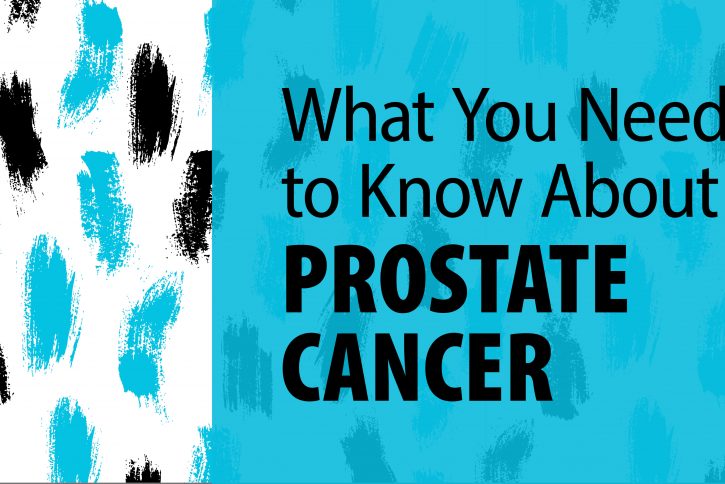
Article originally published September 7, 2022.
Prostate cancer begins in the prostate – a gland that is only found in men – and can only be diagnosed in men. Located just below the bladder, the prostate produces fluid that keeps a man’s sperm alive and healthy.
Most prostate cancers grow very slowly and may not cause symptoms for years – some men may have the disease but never know it.
One in eight men will be diagnosed with prostate cancer in his lifetime.
Other than skin cancer, prostate cancer is the most common cancer and the second leading cause of cancer death in men in the United States. Prostate cancer accounts for 14% of all new cancer cases in the United States.
Six out of ten cases of prostate cancer are found in men aged 65 and older.
Prostate cancer is more common in older men than in younger ones, with the average age of diagnosis being 67.
The majority of prostate cancer cases are found before symptoms develop through screenings.
Symptoms generally only develop in the advanced stages of prostate cancer. Screenings – like PSA blood tests and rectal exams – may help to find prostate cancer in its early stages. Learn more about prostate cancer screening.
About 97% of men with prostate cancer survive five years or more after diagnosis.
This increase is likely due to improved screening and treatments. The death rate for prostate cancer is higher among African American men, those with advanced stage prostate cancer and men who are aged 75 to 84.
Risk Factors
- Age – Prostate cancer risk rises quickly after age 50.
- Race and ethnicity – This disease is more common in African American men.
- Geography – Prostate cancer is more common in North America than in some other parts of the world.
- Family history – Risk is doubled by having a father or brother with prostate cancer, and the chances go up further if a person has multiple affected relatives.
- Genetics – Certain inherited mutations or gene changes can increase the risk of prostate cancer.
Signs and Symptoms
Early-stage prostate cancer generally causes no symptoms. Signs of advanced prostate cancer may include:
- Urination issues: including a slow or weak urine stream; frequent need to urinate, especially at night
- Blood in the urine or semen
- Difficulty getting an erection (erectile dysfunction)
- Hip, back or chest pain
- Loss of bladder or bowel control
- Weakness or numbness in the legs or feet
These symptoms are likely to be caused by common problems that are not prostate cancer. Discuss any changes in your body’s function with your healthcare provider.
If you are experiencing symptoms of prostate cancer or want to learn more about prostate cancer screening, talk with your healthcare provider or contact our Fairfield Healthcare Professionals Urology office at 740-689-4945.